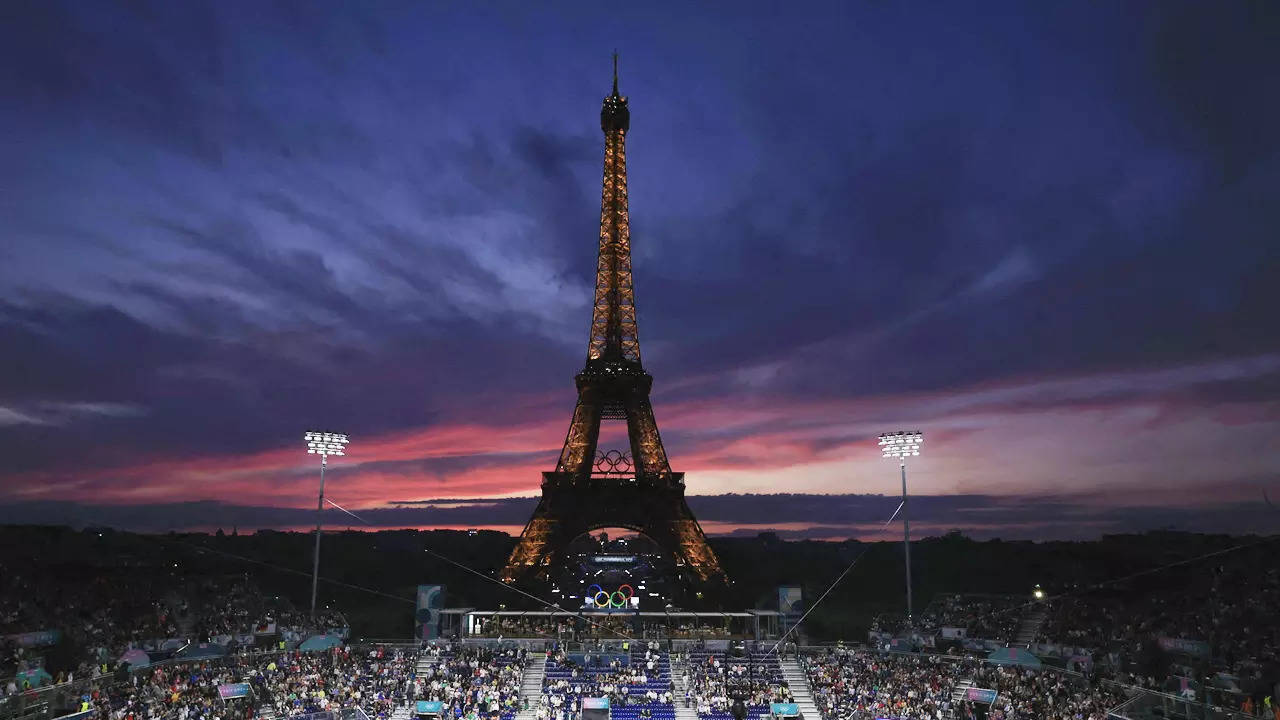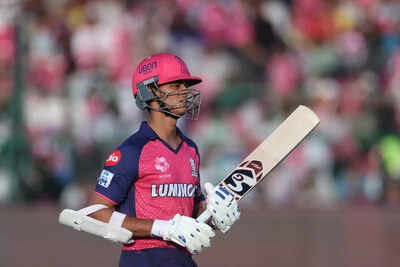PARIS: The boats from Friday’s opening ceremony all stowed away, the Olympics have well and truly begun. The constant drizzle over the city, its gloomy skies, raincoats and umbrellas — parapluies, in these parts — and the mawkish expressions of the Parisians, is just a distraction. Don’t fall for it.
Soon the skies will clear, the sun will shine through, bring with it that breeze, returning the city to old ways of its famous summer.Be distracted by that.
But until then, Italy and Brazil are battling it out on the volleyball court, a high-octane clash that could remind an old-timer of the 1980s and ’90s football matches of the sporting heavyweights. Inside the Paris Expo Porte de Versailles, the venue for the volleyball tournament, in a sign of the changed times, spectators are happier waving their cellphones with the torches on than hollering at each other as the Italians prevail 3-1.
Later in the evening, Rafa Nadal, the adopted son of Paris, and the sport’s heir apparent, Carlos Alcaraz will line-up together for Spain on the clay of Roland Garros. It is an early-day marquee event, a big-ticket, the opposition doesn’t matter, even if it happens to be Argentina (there’s very little of the football parallel at play here). But how weird it must feel to perform at a venue that bears a statue of you at the entrance – an installation in steel capturing a furious backhand return at full tilt – what else is left to do, to prove? But then this is Nadal, this is his ‘home’, the Paris Olympics is his final appearance and while there are contenders banging on the door, his doubles partner here, no less, no one can evict him from his Parisian apartment.
Talking of home, and of statues, the Spaniard, with the sneer-smile but impeccable manners, was at hand to take over the torch from Zinedine Zidanethat other human installation France has erected, in an opening ceremony symbolism that spoke volumes. The French, with their avant garde thought and fearlessness to express, may just have attempted the most outrageous pageantry with their aqua-tableau over the Seine Friday. That they had gotten away with it, may have irked the English-speaking press no end, who in their self-appointed roles as the world’s judges of anything and everything, were decreeing that even after they had walked on water, the French had still come up short. And that, the opening ceremony of the 2012 London Olympics – even if no one remembers how it went – remains the bar that is yet to be surpassed. Talk about being stranded on an island.
But in an opening ceremony meant to showcase sporting excellence, hope and glory – much of it bankrolled by global corporate wealth — when you pre -sent Dionysus, the Greek god of wine and ecstasy, telling us not to take ourselves too seriously, or nudging us to reflect on the absurdities we spawn by that, the rest of the world will carp in a reluctant, grudging acceptance of cultural superiority. When you have the moral courage to depict inclusiveness, gender equality and the freedom to choose with suggestions of a threesome – the much-malinged menage a trois in these parts – the conservatives will be shocked, their sensibilities shaken, but you needn’t explain yourself. It was in this strange cultural mélange – there were more global stars that Paris invited to be part of their theatre than others can ever even begin to think of – that the calming reassuring presence of Zidane may have soothed the nerves of the easily outraged.
Not that the mostly-unspeaking, famously apolitical Frenchman returns us to conservatism, but it is his universal appeal that unites us all despite usually being out of reach, of touching distance. Imagine what unique aura Zidane must possess then, that 26 years after his face was plastered on the façade of the Arc de Triomphe after a thankful nation chanted his name – the son of an Algerian immigrant – for delivering France their first World Cup in 1998, on Friday, of all of France’s great Olympians, his presence has stayed with us much after the last boat came in.
Soon the skies will clear, the sun will shine through, bring with it that breeze, returning the city to old ways of its famous summer.Be distracted by that.
But until then, Italy and Brazil are battling it out on the volleyball court, a high-octane clash that could remind an old-timer of the 1980s and ’90s football matches of the sporting heavyweights. Inside the Paris Expo Porte de Versailles, the venue for the volleyball tournament, in a sign of the changed times, spectators are happier waving their cellphones with the torches on than hollering at each other as the Italians prevail 3-1.
Later in the evening, Rafa Nadal, the adopted son of Paris, and the sport’s heir apparent, Carlos Alcaraz will line-up together for Spain on the clay of Roland Garros. It is an early-day marquee event, a big-ticket, the opposition doesn’t matter, even if it happens to be Argentina (there’s very little of the football parallel at play here). But how weird it must feel to perform at a venue that bears a statue of you at the entrance – an installation in steel capturing a furious backhand return at full tilt – what else is left to do, to prove? But then this is Nadal, this is his ‘home’, the Paris Olympics is his final appearance and while there are contenders banging on the door, his doubles partner here, no less, no one can evict him from his Parisian apartment.
Talking of home, and of statues, the Spaniard, with the sneer-smile but impeccable manners, was at hand to take over the torch from Zinedine Zidanethat other human installation France has erected, in an opening ceremony symbolism that spoke volumes. The French, with their avant garde thought and fearlessness to express, may just have attempted the most outrageous pageantry with their aqua-tableau over the Seine Friday. That they had gotten away with it, may have irked the English-speaking press no end, who in their self-appointed roles as the world’s judges of anything and everything, were decreeing that even after they had walked on water, the French had still come up short. And that, the opening ceremony of the 2012 London Olympics – even if no one remembers how it went – remains the bar that is yet to be surpassed. Talk about being stranded on an island.
But in an opening ceremony meant to showcase sporting excellence, hope and glory – much of it bankrolled by global corporate wealth — when you pre -sent Dionysus, the Greek god of wine and ecstasy, telling us not to take ourselves too seriously, or nudging us to reflect on the absurdities we spawn by that, the rest of the world will carp in a reluctant, grudging acceptance of cultural superiority. When you have the moral courage to depict inclusiveness, gender equality and the freedom to choose with suggestions of a threesome – the much-malinged menage a trois in these parts – the conservatives will be shocked, their sensibilities shaken, but you needn’t explain yourself. It was in this strange cultural mélange – there were more global stars that Paris invited to be part of their theatre than others can ever even begin to think of – that the calming reassuring presence of Zidane may have soothed the nerves of the easily outraged.
Not that the mostly-unspeaking, famously apolitical Frenchman returns us to conservatism, but it is his universal appeal that unites us all despite usually being out of reach, of touching distance. Imagine what unique aura Zidane must possess then, that 26 years after his face was plastered on the façade of the Arc de Triomphe after a thankful nation chanted his name – the son of an Algerian immigrant – for delivering France their first World Cup in 1998, on Friday, of all of France’s great Olympians, his presence has stayed with us much after the last boat came in.







